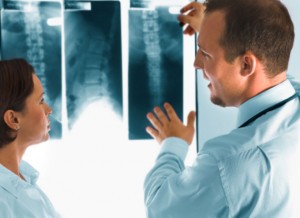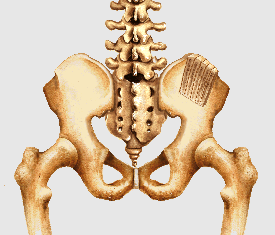Lumbar Spinal Fusion
Table of Contents
Lumbar Spinal Fusion
Most Common Causes of Lumbar Back Pain
Your Visit With The Surgeon
Getting Yourself Ready For Surgery
Understanding Back Precautions
Making Arrangements For Surgery
Your Hospital Visit
Lumbar Spinal Fusion Surgery
Recovery At Home
When To Call Your Surgeon
Long Term Care For Your Back
More Information:
Lumbar Spine Structure and Function
 Your surgeon will explain the results of your exam, x-rays, and diagnostic tests. He will tell you why surgery is recommended. He will explain the surgical procedure and the outcome you can expect. He will tell you about the risks of having or not having the surgery, the benefits of having the surgery, and the options available to you in place of surgery. Do not be afraid of offending the surgeon or embarrassing yourself by asking questions about anything you don’t understand. The more you know, the more confident you will be about doing your part in your treatment and recovery.
Your surgeon will explain the results of your exam, x-rays, and diagnostic tests. He will tell you why surgery is recommended. He will explain the surgical procedure and the outcome you can expect. He will tell you about the risks of having or not having the surgery, the benefits of having the surgery, and the options available to you in place of surgery. Do not be afraid of offending the surgeon or embarrassing yourself by asking questions about anything you don’t understand. The more you know, the more confident you will be about doing your part in your treatment and recovery.
Your surgeon will ask you to read and sign a surgical consent form. This form is a legal paper that says your surgeon has told you about your surgery and any risks you are taking. By signing this form, you are saying that you agree to have the surgery and understand the risks involved. Ask your surgeon about any concerns you have before you sign this form.
Questions To Ask Your Surgeon About Spinal Fusion
The decision whether to have spinal fusion is complex and involves many factors about the type of condition the fusion is treating, your age and overall health, and your anticipated level of function after the surgery. This decision must be made carefully and should be talked about thoroughly with your surgeon. You will want to learn as much as you can about your surgery and recovery. The following are some questions you can ask your surgeon. You may have others. Try to get all questions answered during your visit so you understand everything clearly before surgery.
• How soon should I have surgery?
• Will I need a blood transfusion? If so, how many units? Can I donate my own blood?
• Will you use my bone (autograft) or cadaver bone (allograft)?
• How long will my surgery last?
• How long will I be in the hospital?
• How much pain should I expect right after surgery? How will it be controlled?
• What will the scar look like?
• Will I have metal pins, screws, or plates with the fusion?
• What are the possible complications of surgery and recovery? How likely are they to happen to me?
• How long will my recovery take?
• Will I need a brace? If so, what type? When should I be fitted?
• Will I need special equipment when I get home?
• What activities will I be able to do or not do during recovery?
• When can I return to work?
• What are the limitations of spinal fusion?
Bone Graft

With spinal fusion your surgeon is trying to stop the movement in a segment of your spine. This is done by using a bone graft as “glue” to join the vertebrae. The bone graft used in your fusion can come from:
• yourself (autograft) – bone comes from you, usually your pelvis. The bone is taken at the time of surgery.
• a donor (allograft) – this is bone that is compatible with yours.
Your surgeon will tell you more about the bone graft and what is best for you.
Talk With Your Surgeon About:
• diet – should you change your diet in any way?
• exercise – should you start, stop, or continue exercising?
• weight – would it help your surgery and recovery to lose or gain a few pounds?
• medicines – which medicines should you start, stop, or continue taking? Talk with your surgeon about all medicines that you take regularly or occasionally, including prescription and over-the-counter medicines.
Anti-inflammatory medicine may slow down the healing process. If you take any of the following medicines, ask your surgeon if you should stop taking them and for how long.
Actron
Advil
Aleve
Anacin
Anaprox
Bayer aspirin
Bufferin
Cataflam
Clinoril
Daypro
Dolobid
Feldene
Indocin
Lodine
Meclomen
Motrin
Nalfon
Nuprin
Orudis
Relafen
Tolectin
Toradol
Voltaren